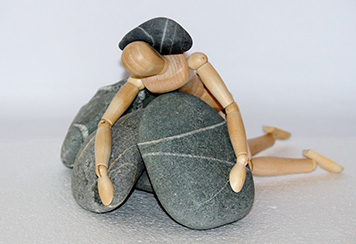Ginger: A delicious & healthful anti-inflammatory
8 Health Benefits of Ginger
Expectorant
Breaks up phlegm
Antiemetic
Reduces nausea
Anti-inflammatory
Reduces swelling & pain
Carminative
Decreases gas
Detoxicant
Encourages sweating
Aphrodisiac
Improves circulation
Immunity
Boosts defenses
Absorption
Stimulates insulin
Why does ginger relieve an upset stomach?
The spice made its way into Western culinary traditions by way of eastern trade routes during the European medieval period. But prior to this, the Chinese, Indians, Greeks, and Romans used it for thousands of years in their own foods and medicines. Like many flavorful herbs and spices, it’s full of antioxidants that can benefit your health by reducing inflammation. Head over here to learn why that’s so important to fitness and wellness.
Why did I think to write about this? A guest this weekend got violently ill after eating too much and then drinking some beer. Days later, and I’m only just now realizing I keep ginger tisane on hand for instances exactly like this. However, in the heat of the panicky moment, I went instead for crystallized or pickled ginger. Then I discovered I had none of either left, so I went for the pure essential oil instead. He instantly felt better, but why do any of these work?
The Visceral Explanation: I just feel it in my gut
Muscles line the digestive system/gastrointestinal (GI) tract. These muscles are involuntary, so the parasympathetic nervous system controls their activity without any input from your conscious thoughts. That’s really convenient! (I can barely concentrate enough to do my taxes, so all this other stuff definitely needs to happen on its own.)
What does that have to do with ginger? Nerve receptors that trigger movement in these muscles cover the tissues of your GI tract. These microscopic surfaces work like locks: Hormones and enzymes that fit certain spaces unlock different reactions. Serotonin is like a key, and it’s an example of one of the neural transmitters floating around in your guts. One of its many functions is to regulate the contractions of your bowels. It does this by fitting inside these neural locks and unlocking their movement potential. If too many locks open at once, you get spasms.
From our friends at Wikipedia:
The gut is surrounded by enterochromaffin cells, which release serotonin in response to food in the lumen. This makes the gut contract around the food. Platelets in the veins draining the gut collect excess serotonin.
.
If irritants are present in the food, the enterochromaffin cells release more serotonin to make the gut move faster, i.e., to cause diarrhea, so the gut is emptied of the noxious substance. If serotonin is released in the blood faster than the platelets can absorb it, the level of free serotonin in the blood is increased. This activates 5-HT3 receptors in the chemoreceptor trigger zone that stimulate vomiting. The enterochromaffin cells not only react to bad food but are also very sensitive to irradiation and cancer chemotherapy. Drugs that block 5HT3 are very effective in controlling the nausea and vomiting produced by cancer treatment, and are considered the gold standard for this purpose.
Explaining it gingerly
And guess what? Yep! Components within ginger do exactly that. According to Lete and Allué, they block 5HT3 (especially 6-shogaol in dried ginger, and 6-gingeral when it’s fresh). They are the powerful components of the spice that make your tummy feel better when it’s icky.
So, the take away? Ginger coats your GI tract with its spicy yum-yum juice, so that serotonin can’t fit into the locks and make you puny. It provides relief from general stomach upset, gas, diarrhea, and nausea. Even more interesting is that ginger quells all sorts of nausea. It even helps whether the pain is caused by food or drink, stress or anxiety, radiation or chemotherapy, as well as menstruation, pregnancy, and surgery.
It’s almost like musical chairs,
and you win once ginger fills more of the seats than serotonin.
Ginger’s effect on blood sugar and diabetes
Type 1 Diabetes
Type 1 Diabetes rats that received even a single dose of ginger (either liquid or powdered) experienced a protective response. As with the serotonin receptors I mentioned previously for nausea, ginger filled spaces that serotonin would have otherwise triggered. The rats’ blood glucose levels dropped, as did their serum triglycerides and total cholesterol levels. They also exhibited increases in their insulin levels and better responses to these improved levels. What’s more, these Type 1 animals did not experience weight loss in their livers or kidneys. Indeed, they maintained their overall body weights. This is important, because Type 1 Diabetes can cause wasting when insufficient levels of insulin prevent the body from getting energy from carbohydrates. When this happens, the body accesses fat and protein stores. In these animals, ginger stimulated insulin production, allowing them to more properly process energy from their food and blood sugar.
Type 2 Diabetes
Type 2 Diabetes rats experienced a panoply of benefits, including significant reductions in body weight. Those animals given 6-gingeral (the same strong component of fresh ginger mentioned above for nausea) had “decreased fasting blood glucose and improved glucose tolerance… lowered plasma triglyceride, total cholesterol, free fatty acid, low-density lipoprotein, and plasma insulin levels.” By every measure, their blood profiles improved dramatically after eating ginger. In these animals, it inhibited the activity of the enzymes α-glucosidase and α-amylase. These two enzymes cleave sugars apart to allow them to be accessed for energy. With their actions prevented, the Type 2 rats didn’t get as much sugar into their blood streams in the first place. With lowered levels of glucose came gradual improvements in insulin sensitivity, which preceded the recovery of all the other aforementioned serum profiles.
Type Pingpong Balls Diabetes
Let’s think about all these bits of glucose (blood sugar) like a package of pingpong balls. If you’re a Type 1 diabetic, you used your trusty enzyme scissors to cut the bag open, the balls spilled out, and now they’re rolling around all over the floor. The problem is that you can’t pick them back up. You need a vacuum cleaner! Insulin is that vacuum cleaner, but your vacuum has weak suction (ie., your pancreas doesn’t produce enough insulin). Ginger boosts the suction on your insulin vacuum cleaner by giving your pancreas a nudge, so now more of the pingpong balls get sucked from underfoot.
If you’re Type 2, you came into the room and there were already pingpong balls everywhere. You need to make sure more balls don’t get on the floor, so that you can have time to vacuum those already in place. Ginger blunts the edge on your enzyme scissors while also boosting your vacuum. In this way, ginger helps you clean up by first preventing a bigger mess and then by giving you more time to suck up what’s already rolling around.
The simultaneous benefits of ginger to Diabetics
If you have too little insulin, ginger reduces your glucose levels by inhibiting key enzymes that cleave complex carbohydrates down to simple sugars. Simultaneously, it also stimulates the pancreas’s production of insulin, which is the hormone that triggers cells to take in energy. Applied together, ginger creates a situation where less glucose enters the blood, and where more of the available glucose enters cells. The result in all instances is that you have improved levels of glucose over time, and this has a cascading effect of improving all the other markers of insulin resistance and diabetes. Oh, and here’s a cute little video I made about insulin and glucose.
How ginger reduces pain and inflammation
As previously mentioned, inflammation is now thought to be the root cause of practically every disease and symptom of aging. According to H. Oshima at the International Agency for Research on Cancer,
“Inflammation activates a variety of inflammatory cells, which induce and activate several oxidant-generating enzymes… These enzymes produce high concentrations of diverse free radicals and oxidants… These species can damage DNA, RNA, lipids, and proteins… leading to increased mutations and altered functions of enzymes and proteins (e.g., activation of oncogene products and/or inhibition of tumor-suppressor proteins) and thus contributing to the multistage carcinogenesis process.”
As explained by Dr. Jun-Ming Zhang at University of Cincinnati, the specific substances that create this damage “…are produced predominantly by activated macrophages and are involved in the up-regulation of inflammatory reactions. There is abundant evidence that certain pro-inflammatory cytokines such as IL-1β, IL-6, and TNF-α are involved in the process of pathological pain.”
Inhibiting inflammation
Ginger plays a very specific role in managing these substances. It improves the symptoms associated with the damage chronic inflammation creates. Once again, it is the substances that give the spice its flavor and aroma that contribute to this protective action. According to Mashhadi, et al, “Gingerol, shogaol, and other structurally-related substances in ginger inhibit… synthesis of pro-inflammatory cytokines such as IL-1, TNF-α, and IL-8.” These are the exact same substances described as causing the problems in the first pace.
Dosage
The folks at the Arthritis Foundation advise taking ~250mg twice daily. They also suggest looking for products made by the “supercritical extraction method.” Also, “Before taking ginger, be sure to check with your doctor. If you get the ‘go ahead’ from your physician, try a 100- to 200-mg ginger capsule each day for four to six weeks to see if you feel an effect. Steer clear of ginger if you’re taking a blood-thinning medication, like warfarin (Coumadin), as ginger may reverse the effects of these types of drugs.”
You can soothe spasms with ginger, because it fills neuron receptors that serotonin would otherwise fill to trigger contractions
(Note: Ginger Ale sodas rarely contain actual ginger)
Recent Posts

Caffeine: 14 better options to ease SAD
Nearly a year ago to the dot, I wrote an article about Seasonal Affective Disorder (SAD), but there I focused on the importance of getting access to a full range spectrum of light. Here I’d like to focus on caffeine and sleep’s effect on SAD. I’ll also offer suggestions for what to do to help you feel better on the dark days.

Avoid fish oil supplements
I don’t generally promote supplements. Most of them play to specific, isolated points of medical research to serve as a magic pill. One remarkable example of this is fish oil.

Covert Narcissist?! How do I know if I am one?
After a fight with two friends, one of them accused me of being a covert narcissist. That offended me to my core, but then I took a moment to consider whether or not it might be true. What if I am??

